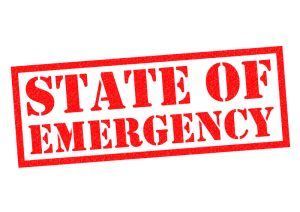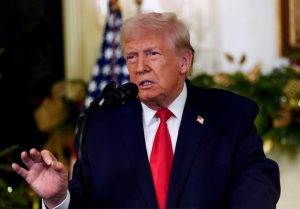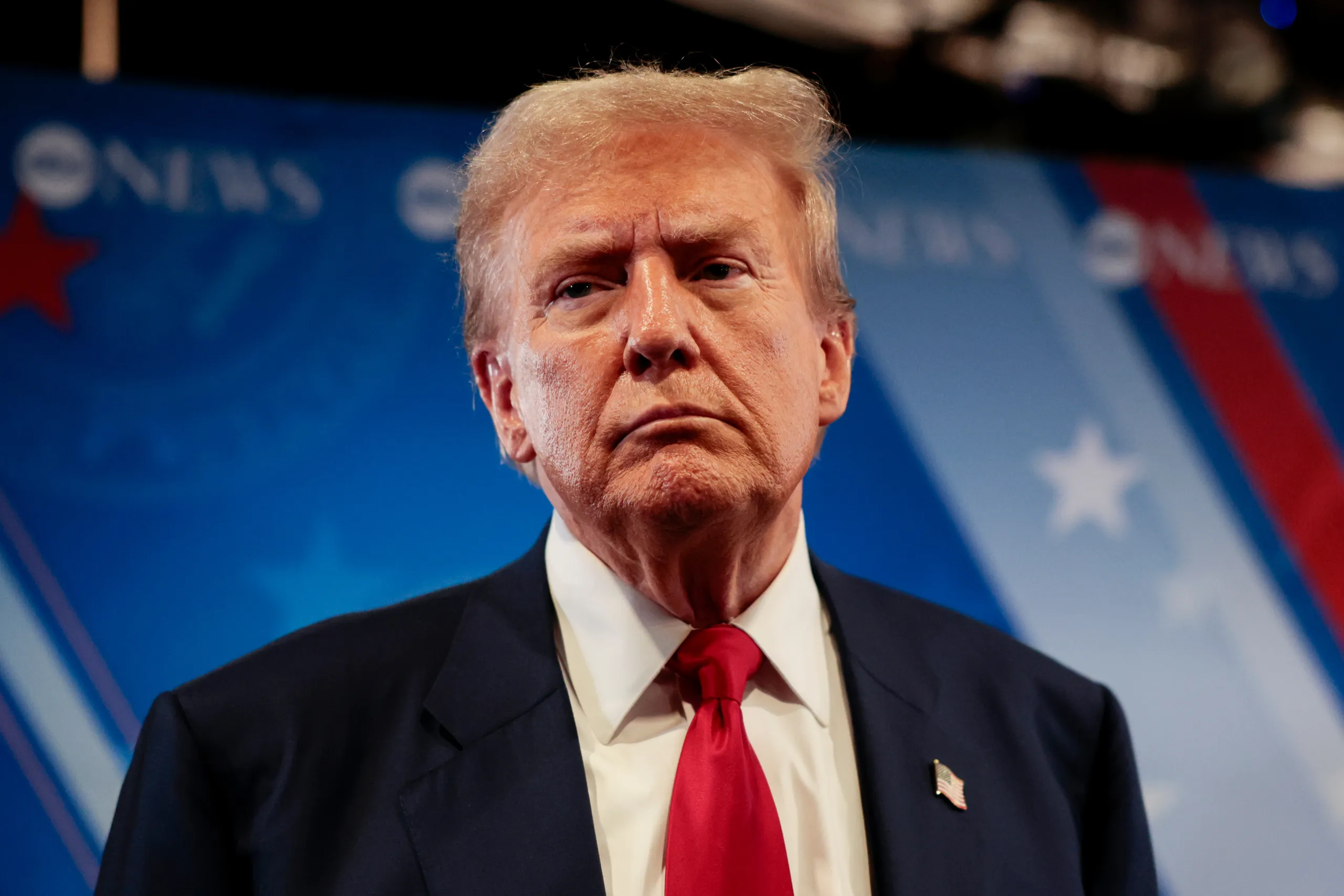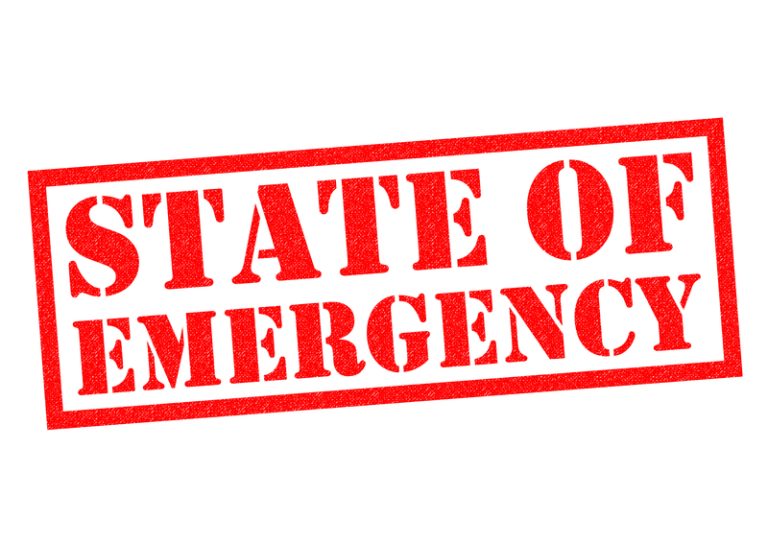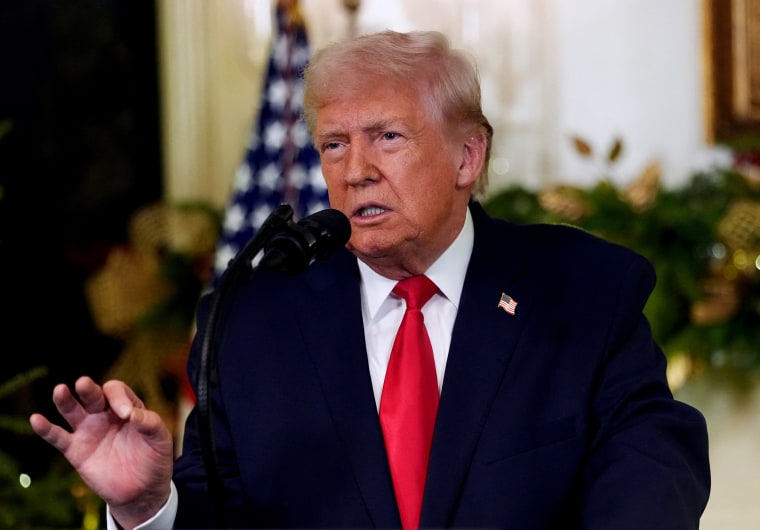In the wake of significant setbacks for the Republican Party on Tuesday, former President Donald Trump issued a pointed warning to the GOP, emphasizing the need for urgent reflection and strategy changes. Speaking both on his Truth Social platform and in person to Republican senators, Trump framed the party’s losses as a consequence of two central factors: the ongoing government shutdown and the fact that his name was not on the ballot.
Late Tuesday night, Trump posted on Truth Social, stating, “‘TRUMP WASN’T ON THE BALLOT, AND SHUTDOWN, WERE THE TWO REASONS THAT REPUBLICANS LOST ELECTIONS TONIGHT, according to Pollsters.” His statement underscored the former president’s perspective that his personal presence on the ballot in past elections has been a significant motivator for Republican voter turnout. The absence of his name, combined with high-profile national political issues such as the government shutdown, formed what Trump described as a “perfect storm” against GOP candidates across the country.
Trump reiterated his assessment the following morning during a breakfast with Senate Republicans, noting that the election results were “not good for Republicans” and that the party had lessons to learn from the outcome. While acknowledging that some of the contests were in heavily Democratic areas where Republican losses were expected, he warned that complacency and inattention to key voter concerns could have broader consequences for the party’s future performance.
The Election Results
The election outcomes on Tuesday reflected a challenging night for Republican candidates in several states and municipalities. In New York City, Zohran Mamdani, a democratic socialist candidate, defeated a rare bipartisan coalition that had coalesced around former Governor Andrew Cuomo. Mamdani’s victory marked a historic win, signaling a potential shift in local political dynamics and highlighting the impact of energized grassroots movements. The race attracted national attention, as both parties and media outlets closely monitored how such a coalition could be overcome in one of the country’s largest urban centers.
Meanwhile, on the West Coast, California voters approved Proposition 50, effectively dismantling the state’s independent redistricting commission, which had been in place for more than two decades. The approval of the measure opens the door for a new congressional map, potentially favoring Democrats and granting them additional representation in future House elections. Observers noted that this development could significantly affect the balance of power in Congress, particularly as the 2026 midterm elections approach.
In New Jersey, the anticipated tight race turned into a decisive victory for Democrat Mikie Sherrill, who defeated Republican Jack Ciattarelli by a double-digit margin. Early results indicated Sherrill capturing approximately 56 percent of the vote compared to 43 percent for Ciattarelli, highlighting a clear preference for the incumbent Democrat. Similarly, in Virginia, Democrat Abigail Spanberger secured a commanding victory over Republican Winsome Earle-Sears, winning by more than 15 points. Analysts pointed out that these results represented significant swings from the previous year, when Trump had lost both states by narrow margins of just over five points.
Although the losses were largely concentrated in historically Democratic-leaning areas, the scale and clarity of the defeats prompted discussions within the GOP about underlying factors and what strategies might be needed to regain political ground.
Trump’s Analysis and GOP Response
Trump’s perspective on the election results focused on two elements he considered decisive: his absence from the ballot and the ongoing government shutdown. He argued that previous Republican successes were closely linked to his personal presence and influence, suggesting that voter enthusiasm waned in his absence. Furthermore, he placed substantial responsibility on the shutdown, portraying it as a critical factor that negatively affected public perception of the party and hindered Republican performance.
Within the GOP, responses were mixed. Some party leaders sought to downplay the significance of the losses, pointing out that many of the races occurred in deep blue districts where defeat was anticipated. These leaders emphasized the importance of viewing the results in context, urging party members to focus on opportunities for growth and candidate development in future elections.
Conversely, some conservative commentators and strategists echoed Trump’s analysis, arguing that structural factors and national political issues, rather than localized campaign failures, were decisive. Discussions within the party highlighted potential reforms to energize the Republican base, including increased engagement with younger voters and urban constituencies, as well as efforts to modernize messaging and outreach strategies.
The Role of Voter Priorities
Independent analysis of voter sentiment following the election suggested a more nuanced story than Trump’s characterization. Exit polls and early reporting indicated that many voters were motivated by concerns over economic issues, including inflation, healthcare, and the overall cost of living. These factors appeared particularly influential in swing districts and states such as New Jersey and Virginia, where voters expressed frustration with both local and national economic conditions.
While Trump emphasized the symbolic and personal elements of the election, including his own absence from the ballot, these broader policy concerns played a significant role in shaping voter behavior. Political analysts noted that focusing solely on personality-driven explanations risked oversimplifying the complex dynamics at play in these elections.
Controversy Surrounding Zohran Mamdani
The results in New York City prompted additional political and legal debates within the Republican Party, particularly regarding the eligibility of Zohran Mamdani to hold office. Some House Republicans and political organizations have explored legal strategies citing the post–Civil War “insurrection clause” of the Constitution, contained in Section 3 of the 14th Amendment. This provision prohibits individuals who have engaged in insurrection or rebellion, or who have provided “aid or comfort” to enemies of the United States, from holding public office.
Leaders of the New York Young Republican Club argued that Mamdani’s previous public statements calling to “resist ICE” and his associations with left-wing organizations could be interpreted as providing aid or comfort to enemies of the United States. The group suggested that these factors might qualify Mamdani for disqualification under Section 3 of the 14th Amendment.
The legal framework surrounding this issue is complex. Section 3 was originally enacted to prevent former Confederate officials from holding public office after the Civil War, but its application has recently re-emerged in political debates over ballot eligibility. The Supreme Court previously ruled on a related matter in Colorado, overturning attempts to disqualify a candidate from the ballot and affirming that Congress, rather than individual states, holds primary enforcement authority over Section 3.
Several House Republicans have reportedly considered legislative or congressional action to apply the clause to Mamdani’s case. Such a move would face significant procedural and legal hurdles, including potential challenges in a Democrat-controlled Senate and likely litigation. Nevertheless, the debate reflects ongoing tension within the GOP over how to navigate controversial electoral outcomes and manage perceived threats from opposition candidates.
Strategic Implications for the GOP
The election outcomes and Trump’s analysis have sparked intense discussion within the Republican Party about strategy and messaging. Some leaders argue that the party must focus on structural reforms to improve turnout, candidate recruitment, and policy communication, while others insist that the party must embrace Trump’s approach of emphasizing loyalty, symbolic leadership, and attention to national issues.
Among the key strategic questions facing the GOP are: how to respond to demographic shifts in urban areas, how to retain and energize suburban voters, and how to address voter concerns related to the economy, healthcare, and governance. The ongoing debate over the insurrection clause and its application to Mamdani also raises broader questions about the party’s legal strategy and the role of Congress in adjudicating eligibility disputes.
Trump’s warning to the GOP is likely to resonate in internal party discussions for months to come. His emphasis on personal influence, ballot presence, and the impact of high-profile national events underscores the ongoing debate about the balance between individual leadership and collective party strategy. Whether the GOP will heed this warning and adjust its approach remains an open question, but the recent election results serve as a clear reminder of the challenges the party faces in a politically dynamic and increasingly polarized landscape.
Looking Ahead
As the party contemplates its next moves, attention is already turning toward future elections. Analysts and party officials alike recognize that maintaining voter enthusiasm, addressing pressing policy concerns, and effectively communicating a cohesive vision will be critical to reversing recent losses. The debates over ballot eligibility, policy priorities, and messaging strategy are likely to intensify, especially as the 2026 midterm elections approach and new congressional maps come into play.
For Trump, the message is straightforward: the Republican Party cannot rely on past success or symbolic victories alone. It must confront structural and political challenges head-on, adapt to changing voter expectations, and navigate complex legal and electoral landscapes. His warning serves as both a critique and a call to action, emphasizing that in the current political climate, inattention and missteps carry real consequences.
In conclusion, Tuesday’s elections provided a sobering moment for the Republican Party. Trump’s analysis of the losses, centered on his absence from the ballot and the government shutdown, highlights the tension between personal influence and broader electoral realities. At the same time, voter priorities and independent analyses point to deeper systemic and policy factors influencing the outcomes. The debates over eligibility, strategic focus, and future leadership will continue to shape the GOP as it seeks to rebound from a challenging election night and prepare for the contests ahead.

Emily Johnson is a critically acclaimed essayist and novelist known for her thought-provoking works centered on feminism, women’s rights, and modern relationships. Born and raised in Portland, Oregon, Emily grew up with a deep love of books, often spending her afternoons at her local library. She went on to study literature and gender studies at UCLA, where she became deeply involved in activism and began publishing essays in campus journals. Her debut essay collection, Voices Unbound, struck a chord with readers nationwide for its fearless exploration of gender dynamics, identity, and the challenges faced by women in contemporary society. Emily later transitioned into fiction, writing novels that balance compelling storytelling with social commentary. Her protagonists are often strong, multidimensional women navigating love, ambition, and the struggles of everyday life, making her a favorite among readers who crave authentic, relatable narratives. Critics praise her ability to merge personal intimacy with universal themes. Off the page, Emily is an advocate for women in publishing, leading workshops that encourage young female writers to embrace their voices. She lives in Seattle with her partner and two rescue cats, where she continues to write, teach, and inspire a new generation of storytellers.


